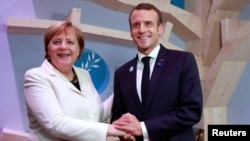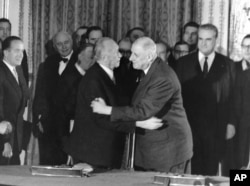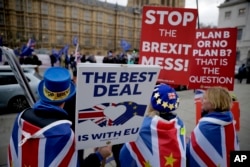On a wintry day more than half a century ago, France and West Germany signed a treaty aimed at turning the page on centuries of conflict that included two devastating world wars.
With a deepening Cold War as a backdrop, European unity was limited to a six-member common market, one that initially rejected Britain’s application. Few would have predicted the treaty in January 1963 would help cement a French-German powerhouse driving what eventually became the 28-member European Union.
Exactly 56 years later, a new pact French President Emmanuel Macron and German Chancellor Angela Merkel are to sign Tuesday carries its own set of challenges. Both leaders are weakened at home, and the EU is struggling with Brexit turmoil, rising nationalism, and divisions over basic issues like migration, the economy and defense.
Some analysts have dismissed the new “Aachen treaty” as lacking substance, while far-right French nationalists have floated false warnings that Paris plans to cede part of its territory and U.N. seat to Berlin. More broadly, the pact raises a broader question: How much does French-German cooperation count in today’s fissured Europe?
“It used to be the case that when France and Germany agreed on something, it more or less eventually became an EU decision,” said Manuel Lafont Rapnouil, head of the Paris office of the European Council on Foreign Relations, “Now, that is not enough anymore.”
The new agreement aims to deepen French-German cooperation in education, the environment, security and economic policy, among other areas.
The German town of Aachen, known in French as Aix-la-Chapelle, is highly symbolic. It was once the capital of medieval Frankish emperor Charlemagne. A year before World War II’s end, it became the first German town captured by allies following a devastating battle.
Treaty falls short
But critics say the new treaty falls far short of lofty ambitions for a more powerful and unified Europe, goals Macron outlined in a 2017 speech, months after taking office. “A new pact, little ambition,” France’s Le Monde newspaper wrote, previewing the deal.
“It’s a basis on which we can work from, but it reflects the limits of both governments,” Joachim Bitterlich, former adviser to former German chancellor Helmut Kohl, in remarks carried by France’s Le Journal du Dimanche newspaper, in which he outlined shortcomings in areas like migration and energy cooperation.
Russian journalist Leonid Bershidsky outlined several obstacles he believes hamper the agreement, such as divergent German-French interests in areas like defense and economic cooperation.
“Symbolic expressions of solidarity are important in these times of disunity and fracturing,” he wrote in a Bloomberg column. “But in real life, working together is tough, even for partners with the best of intentions.”
Low point for Europe
Macron and Merkel meet at a low point in their tenures as leaders. The German chancellor is eyeing the exit, having ceded control of her Christian Democratic Union party to an ally, Annegret Kramp-Karrenbauer. Macron has seen his popularity sink to record lows, amid ongoing “yellow vest” protests against his reforms and the rising cost of living.
While the European Union has displayed unity in Brexit negotiations with Britain, the bloc is divided in many others ways, even as nationalist parties are expected to solidify their growing clout in European Parliament elections this May.
“Britain is leaving. Italy is run by populists. Spain has a minority government. Poland and Hungary are run by illiberal parties,” The Economist magazine wrote, summing up some of the roadblocks, “and no government wants to give institutions in Brussels more power to take the lead.”
In France, the yellow vest protesters have spread rumors originating from the hard-right that Macron aims to cede the Alsace-Lorraine region to Germany, while far-right leader Marine Le Pen suggested the Aachen pact envisions sharing France’s permanent U.N. Security Council seat with Berlin — claims the French presidency dismisses as “obviously false.” The treaty stipulates, in fact, that both countries will prioritize seeking a permanent Security Council seat for Germany.
No alternatives
Yet few EU analysts see an alternative to France and Germany as the ultimate glue binding the bloc, and some believe even symbolic affirmations of unity matter.
“After Brexit, after the migration crisis, after everything we’ve had, let’s simply make the political statement that we 27 EU member states would like to continue and improve European Union cooperation,” said Frantisek Ruzicka, Slovakia’s state secretary for European Affairs, during a recent visit to Paris. Without strong French-German cooperation, he added, “European cooperation will not exist.”
The Aachen treaty “is there to remind both countries and the rest of Europe that even when they don’t see eye to eye, even when it’s difficult, this relationship is important,” said Lafont Rapnouil of the European Council on Foreign Relations. “Both countries believe it’s important, and that’s where everything starts.”








